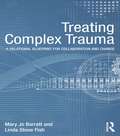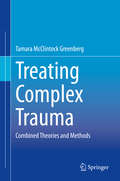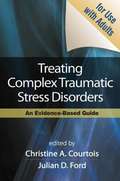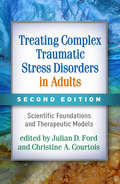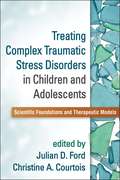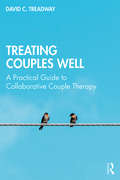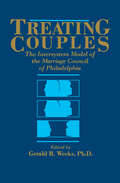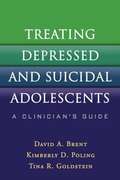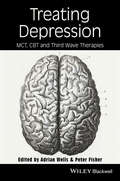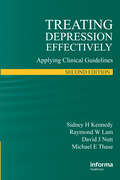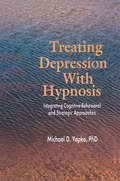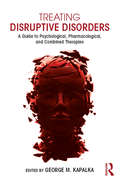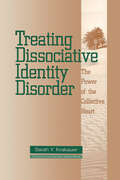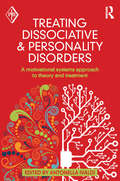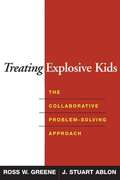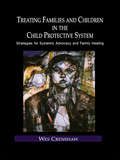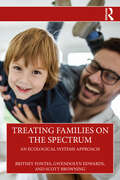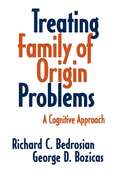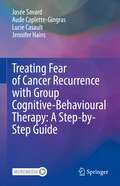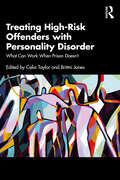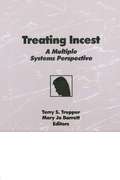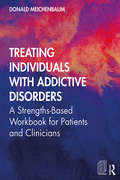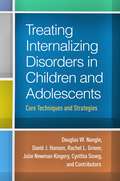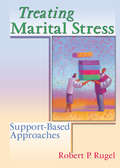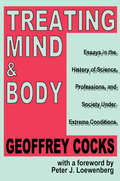- Table View
- List View
Treating Complex Trauma: A Relational Blueprint for Collaboration and Change (Psychosocial Stress Series)
by Mary Jo Barrett Linda Stone FishIn Treating Complex Trauma, renowned clinicians Mary Jo Barrett and Linda Stone Fish present the Collaborative Change Model (CCM), a clinically evaluated model that facilitates client and practitioner collaboration and provides invaluable tools for clients struggling with the impact and effects of complex trauma. A practical guide, Treating Complex Trauma organizes clinical theory, outcome research, and decades of experiential wisdom into a manageable blueprint for treatment. With an emphasis on relationships, the model helps clients move from survival mindstates to engaged mindstates, and as a sequential and organized model, the CCM can be used by helping professionals in a wide array of disciplines and settings. Utilization of the CCM in collaboration with clients and other trauma-informed practitioners helps prevent the re-traumatization of clients and the compassion fatigue of the practitioner so that they can work together to build a hopeful and meaningful vision of the future.
Treating Complex Trauma: Combined Theories and Methods
by Tamara McClintock GreenbergThis forward-thinking volume outlines several approaches to therapeutic treatment for individuals who have experienced complex childhood and adult trauma, providing a novel framework for helping patients with a number of challenging symptoms, with clinical hypothesis testing and solid therapeutic relationships as a vital foundation. Responding to the intense disagreement and competition among clinicians championing their own approaches, the book identifies the strengths and limitations of multiple therapeutic approaches, addressing the need for qualified clinicians to be versed in multiple theories and techniques in order to alleviate suffering in their clients. Among the topics discussed: How to choose specific therapeutic methods and when to shift techniquesThe neurobiology of trauma and management of fearCultural and ethnic considerations in trauma treatmentAddressing avoidance and creating a safe therapeutic environmentManagement of dissociation, substance abuse, and anger Treating Complex Trauma: Combined Theories and Methods serves as a practical guide for clinicians looking to expand their knowledge of approaches for treating complex trauma. It aims to provide clinicians with options for different therapeutic methods, along with the necessary context for them to select the most effective approach in their treatments."For the first time in the professional literature we are finally afforded a clear, cogent, and detailed explication of complex trauma and the multifaceted parameters of treatment. Dr. Tamara McClintock Greenberg provides perspicacious insight and clinical wisdom only a seasoned career therapist can yield. Offering sophisticated and nuanced distinctions between complex trauma and PTSD, she shows how treatment is necessarily contextual and tailored to the unique clinical and personality dynamics of the sufferer that is thoroughly client specific within the therapeutic dyad. She dispenses with simplistic and supercilious attitudes that embarrassingly boast a uniform or manualized treatment to trauma, instead carefully taking into consideration polysymptomatic, neurobiological, and socialcultural differences that inform the interpersonal, emotional, and safety milieu from the beginning of treatment to stabilization, the working-through process, and then onto successful recovery. This is a must-read book for those in training and senior clinicians alike." --Jon Mills, PsyD, PhD, ABPP, Faculty, Postgraduate Programs in Psychoanalysis & Psychotherapy, Adelphi University, NY; author of Treating Attachment Pathology"Dr. Greenberg has written an invaluable book on treating complex trauma. She delves into multiple approaches, assessing what techniques the client can tolerate at a given therapeutic stage. She covers how to maintain consistency and connection through a flexible approach and avoid pitfalls. This is a must read for clinicians wishing to treat clients with complex PTSD." --Louann Brizendine, MD, Clinical Professor UCSF; author of The Female Brain
Treating Complex Traumatic Stress Disorders
by Christine Courtois Julian D. FordChronic childhood trauma, such as prolonged abuse or family violence, can severely disrupt a person's development, basic sense of self, and later relationships. Adults with this type of history often come to therapy with complex symptoms that go beyond existing criteria for posttraumatic stress disorder (PTSD). This important book brings together prominent authorities to present the latest thinking on complex traumatic stress disorders and provide practical guidelines for conceptualization and treatment. Evidence-based assessment procedures are detailed, and innovative individual, couple, family, and group therapies are described and illustrated with case vignettes and session transcripts.
Treating Complex Traumatic Stress Disorders in Adults: Scientific Foundations and Therapeutic Models
by Bessel A. van der KolkThis authoritative reference on complex traumatic stress disorders (CTSDs) and their assessment and treatment has now been significantly revised with more than 75% new material reflecting a decade of advances in the field. Leading experts delve into ways to understand, engage, assess, and treat adults with complex trauma histories, whose symptoms often include but may go well beyond those of posttraumatic stress disorder. The volume presents cutting-edge theory and research on CTSDs, considers diagnostic controversies, and identifies core elements of effective, culturally responsive treatment. Established and emerging therapies specifically tailored to this population are described and illustrated with vivid case examples. Other highlights are chapters on transtheoretical treatment, the crucial role of professionalism and training, and recognizing and managing vicarious traumatization. New to This Edition *Incorporates major advances in research and clinical practice. *Chapters on additional evidence-based individual treatments: prolonged exposure therapy, cognitive therapy, cognitive processing therapy, brief eclectic psychotherapy, eye movement desensitization and reprocessing therapy, narrative exposure therapy, interpersonal psychotherapy, emotion-focused therapy, and the TARGET recovery model. *Chapters on additional evidence-based group and conjoint family therapy models: attachment-based couple therapy and integrated treatment of co-occurring CTSDs and substance use disorders. *Chapters on promising treatments: treatment for structural dissociation, experiential/somatotherapy approaches, mindfulness approaches, and complementary healing therapies. See also Drs. Ford and Courtois's authored book, Treatment of Complex Trauma, which presents their own therapeutic approach for adult clients in depth, and their edited volume Treating Complex Traumatic Stress Disorders in Children and Adolescents.
Treating Complex Traumatic Stress Disorders in Children and Adolescents
by Julian D. Ford Christine A. CourtoisWith contributions from prominent experts, this pragmatic book takes a close look at the nature of complex psychological trauma in children and adolescents and the clinical challenges it presents. Each chapter shows how a complex trauma perspective can provide an invaluable unifying framework for case conceptualization, assessment, and intervention amidst the chaos and turmoil of these young patients' lives. A range of evidence-based and promising therapies are reviewed and illustrated with vivid case vignettes. The volume is grounded in clinical innovations and cutting-edge research on child and adolescent brain development, attachment, and emotion regulation, and discusses diagnostic criteria, including those from DSM-IV and DSM-5.See also Drs. Courtois and Ford's edited volume Treating Complex Traumatic Stress Disorders (Adults) and their authored volume, Treatment of Complex Trauma: A Sequenced, Relationship-Based Approach.
Treating Couples Well: A Practical Guide to Collaborative Couple Therapy
by David C. TreadwayTreating Couples Well shows clinicians how to create a collaborative approach to couple therapy, which will empower couples to take charge of their own treatment. Written in an engaging and conversational style, the book carefully explains how to help couples choose between a variety of clinical approaches and offers effective treatment strategies for a wide range of issues, including infidelity, intimacy and sexuality, communication, mental illness, and addiction. Chapters also explore the importance of considering the therapist’s own life experience and its impact on working with couples. Practical interventions, clinical vignettes, and homework exercises are included throughout to help therapists to successfully support the needs of each couple and to encourage meaningful work between sessions. Drawing on a plethora of case examples from the career of a leading couple therapist, Treating Couples Well will be a valuable resource to couple and marriage and family therapists at all levels.
Treating Couples: The Intersystem Model Of The Marriage Council Of Philadelphia
by Gerald R. WeeksIn some ways the development of the theory and practice of marital therapy seems like a relative newcomer to those clinicians who practice systems therapy. Most of the books in the field stress the total family as the unit of treatment in terms of understanding the dynamics of family interactions and intervention techniques. For the past 15 or 20 years, clinicians interested in systems work sought training in "family" therapy programs and at "family" therapy workshops. This training led to a dramatic shift in the practice of psychotherapy away from the individual as the unfit of treatment to the family. Much less emphasis has been given to the marital dyad or couple as the unit of treatment.
Treating Depressed and Suicidal Adolescents
by David Brent Kimberly PolingGrounded in decades of research and the clinical care of thousands of depressed and suicidal teens, this highly accessible book will enhance the skills of any therapist who works with this challenging population. The authors describe the nuts and bolts of assessing clients and crafting individualized treatment plans that combine cognitive and behavioral techniques, emotion regulation interventions, family involvement, and antidepressant medication. Illustrated with many clinical examples, each chapter includes a concise overview and key points. Reproducible treatment planning forms and client handouts can also be downloaded and printed by purchasers in a convenient full-page size.
Treating Depression
by Adrian Wells Peter FisherA practical and conceptual guide to treating depression using both Beckian CBT and the latest, cutting-edge third wave CBT approaches, including mindfulness and metacognitive therapy. It provides an understanding of depression and its treatment and a clear practical guidance on how to use each treatment approach. Covers CBT, metacognitive therapy, and third-wave behavioural approaches within one volume Presents the theoretical background and evidence for each approach, and describes application in a clear case study approach which clearly outlines the contrasting features of the treatments Includes separate chapter commentaries on the theory and clinical material covered Internationally renowned contributors include Arthur Nezu, David A. Clark, Robert Zettle, Keith Dobson, Ruth Baer, Adrian Wells and Robert Leahy
Treating Depression Effectively: Applying Clinical Guidelines
by Michael E. Thase Raymond W. Lam David J. Nutt Sidney H. KennedyThis is the second edition of a very successful title from an international team of highly respected opinion leaders. Its emphasis remains on how the clinical guidelines are to be interpreted effectively in everyday practice, and as such it has immense practical importance for clinical psychiatrists as an immediate source of reference. New to this
Treating Depression With Hypnosis: Integrating Cognitive-Behavioral and Strategic Approaches
by Michael D. YapkoDepression is a debilitating human condition and a common cause of suffering worldwide. This elicits a sense of urgency for mental health professionals to meet this challenge of the treatment of depression. Hypnosis plays a vital role in that treatment and in the efficacy of psychotherapy. This book focuses on the structuring and delivering of hypnotic interventions for major depression, with a substantial use of concepts and techniques from cognitive-behavioral and strategic approaches as a foundation. Current research on depression is used in this book to emphasize the still-growing knowledge of depression. Hypnosis has shown itself to be effective in not only reducing symptoms, but in teaching the skills (such as rationale thinking, effective problem-solving and coping strategies, and positive relationship skills) that can even prevent recurrences. Mental health professionals will find the detailed examples of hypnotic strategies invaluable to their own practice and application of hypnosis in the treatment of depression.
Treating Disruptive Disorders: A Guide to Psychological, Pharmacological, and Combined Therapies (Clinical Topics in Psychology and Psychiatry)
by George KapalkaTreating Disruptive Disorders is a practical book for busy clinicians—psychiatrists, psychologists, mental health counselors, clinical social workers, and more—as well as students, interns, or residents in the mental health professions. It distills the most important information about combined as well as solitary treatments of a variety of psychological disorders characterized by disruptive behaviors, including those where disruptive aspects are part of core symptoms (like ADHD, ODD, or conduct disorder), and those where disruptive features are commonly associated with core symptoms (like mood, personality, and cognitive/developmental disorders). In addition to an analysis of the best in evidence-based practice and research, the volume also includes brief clinical vignettes to help present the material in an easily accessible, understandable, readable, and relevant format. The chapter authors are experts in the treatment of these disorders and review a wide variety of empirically supported treatments for children, adolescents, and adults.
Treating Dissociative Identity Disorder: The Power of the Collective Heart
by Sarah Y. KrakauerFirst published in 2001. Routledge is an imprint of Taylor & Francis, an informa company.
Treating Dissociative and Personality Disorders: A Motivational Systems Approach to Theory and Treatment (Psychoanalytic Inquiry Book Series)
by Antonella IvaldiTreating Dissociative and Personality Disorders draws on major theorists and the very latest research to help formulate and introduce the Relational/Multi-Motivational Therapeutic Approach (REMOTA), a new model for treating such patients within a clinical psychoanalytic setting. Supported by her fellow contributors, Antonella Ivaldi provides an overview of existing theories and evidence for their effectiveness in practice, sets out her own theory in detail and provides rich clinical detail to demonstrate the advantages of the REMOTA model as applied in a clinical setting. The narratives in this book show how it is possible to integrate different contributions within a multidimensional aetiopathogenic treatment model, which considers the mind as a manifestation of the relationship between body and world. From a conceptual perspective, according to which consciousness emerges and develops in the interpersonal dimension, this book shows how it becomes possible to understand, in the therapeutic space, what stands in the way of sound personal functioning, and how to create the conditions for improving this. Treating Dissociative and Personality Disorders will be highly useful in addressing the particular clusters of symptoms presented by patients, stimulating therapists of different backgrounds to explore the complexity of human nature. On reading this book, it will become clear that theories can truly become useful instruments, if approached with a critical mind and with humbleness, in order to venture into what we do not know and will never know completely: the relationship with the other, unique and irreplaceable. Treating Dissociative and Personality Disorders provides an integrative and comparative new approach that will be indispensable for combining relational clinical knowing and motivational theories. It will appeal to psychoanalysts and psychotherapists, especially those in training, clinicians of different backgrounds interested in comparative psychotherapy, as well as social workers and graduate and postgraduate students.
Treating Explosive Kids
by Ross Greene J. Stuart AblonThe first comprehensive presentation for clinicians of the groundbreaking approach popularized in Ross Greene's acclaimed parenting guide, The Explosive Child, this book provides a detailed framework for effective, individualized intervention with highly oppositional children and their families. Many vivid examples and Q&A sections show how to identify the specific cognitive factors that contribute to explosive and noncompliant behavior, remediate these factors, and teach children and their adult caregivers how to solve problems collaboratively. The book also describes challenges that may arise in implementing the model and provides clear and practical solutions. Two special chapters focus on intervention in schools and in therapeutic/restrictive facilities.
Treating Families and Children in the Child Protective System: Strategies for Systemic Advocacy and Family Healing (Routledge Series on Family Therapy and Counseling #4)
by Wes CrenshawWritten by a psychologist who has worked with families and foster children for 11 years, Treating Families and Children in the Child Protective System is designed for therapists, social workers, family preservationists, court officers, attorneys, judges, and others caught up in the interplay of child protection. Using theory and compelling case studies, the author posits child abuse as an ultimate form of family injustice, requiring intervention at every level of the system. The author proposes a critically optimistic stance, approaching each case as a family-friend with practical and powerful tools to direct the overwhelming power of the system into a force for the restoration of family justice.
Treating Families on the Spectrum: An Ecological Systems Approach
by Britney Fontes Gwendolyn Edwards Scott BrowningThis book outlines how therapists and families who have a child with autism spectrum disorder (ASD) can use an ecological systems approach, which offers a holistic and nuanced model that treats the entire family system rather than just the individual.Filled with case studies and empirically supported suggestions from clinical practice, this comprehensive book provides an applied therapeutic model that supports the whole family, highlighting how various levels of autism can present differing challenges from a family systems lens. Written using a lifespan developmental framework, chapters begin with early diagnosis and cover essential milestones from childhood to adulthood, addressing issues such as clinical concerns for families, children in school, the role of siblings, the extended family, the assessment process, and the anticipated loss of caregivers. This essential resource aims to not reduce behavioural concerns of autism but rather strengthen the entire family system. Going beyond psychoeducation, this book provides practical and clinical approaches to helping families navigate the unique challenges and family dynamics of autism.This book is designed to be read by mental health professionals such as social workers, psychologists, psychiatrists, and marriage and family therapists, as well as family members themselves.
Treating Family Of Origin Problems: A Cognitive Approach
by Richard C. Bedrosian George D. BozicasThis groundbreaking volume shows how the clarity and discipline of cognitive therapy can be applied to the treatment of family of origin issues, such as alcoholism and incest, without compromising depth and clinical sophistication. Compared to the plethora of books on adult children of dysfunctional families, this work is unique in its use of an integrative cognitive model and structured techniques. The book also shows how ideas highlighted in other orientations--from family therapy to Twelve-Step and "Recovery" programs--can be translated into cognitive terms and incorporated into a cognitive approach. Realistically conveying the complex nature of the treatment process, this book presents the diverse elements of successful therapy not as narrow, rote strategies, but as concepts that can be applied in a wide variety of cases. Treating Family Of Origin Problems begins with a discussion of the characteristics of dysfunctional families and an overview of the cognitive model. Subsequent chapters explore coping strategies, goals of recovery and treatment, diagnostic considerations, and assessment of family of origin issues. Ways in which the therapist's own family of origin issues and the therapist's posture can influence the treatment process are addressed in a discussion of various metacommunicative elements that can affect the client's ability to use treatment constructively. Throughout, illustrative clinical material shows how clinicians can utilize embedded messages and other techniques to circumvent resistance; confront various types of acting-out behavior while remaining in a supportive, collaborative posture; and provide a consistent focus in treatment, highlighting the underlying mechanisms that cause distress without becoming mired in unproductive attention to the presenting symptoms. The volume concludes with discussions of building coping strategies, utilizing relationship material, and variations in the recovery process. Written for mental health professionals from a wide variety of disciplines and theoretical backgrounds, Treating Family Of Origin Problems will provide clinicians who have had little or no exposure to cognitive therapies with a guide to formulating an active treatment plan that can be sustained over time. Cognitive therapists will benefit from the book's illustration of how the cognitive approach can be expanded to embrace key concepts from other treatment orientations. An extremely comprehensive and detailed work, this volume is an ideal text for courses in cognitive therapy, behavior therapy, and integrative psychotherapy, as well as general courses in psychotherapy.
Treating Fear of Cancer Recurrence with Group Cognitive-Behavioural Therapy: A Step-by-Step Guide
by Josée Savard Aude Caplette-Gingras Lucie Casault Jennifer HainsCancer is the leading cause of death in the United States. The improvement of screening procedures and treatments have led to higher survival rates, and consequently to an increased number of individuals who fear that their cancer might come back. Fear of cancer recurrence (FCR) is defined as the fear, worry, or concern that cancer may come back or progress. FCR has been found to be the number one unmet need of cancer survivors. High levels of FCR are associated with greater psychological distress, impaired functioning, decreased quality of life, and increased medical consultations, psychotropic usage and health-care costs. It is therefore crucial to offer these patients an appropriate and effective treatment. The books first propose a theoretical model of FCR that identifies the five main targets of intervention in this program: 1) cognitive interpretation; 2) behavioural avoidance; 3) cognitive avoidance; 4) reassurance and control seeking; 5) intolerance of uncertainty. Then, each target is discussed and specific cognitive-behavioural therapy strategies are suggested that focus on each of them based on the best available empirical evidence for the treatment of anxiety disorders (e.g., generalized anxiety disorder) and cancer-related anxiety. This book will be of interest to clinicians working with cancer patients such as psychologists and other health care providers as well as cancer patients and survivors. Graduate students in clinical health psychology, and connecting disciplines such as psycho-oncology, psychiatry, nursing, social work, rehabilitation, spiritual care, and sexology might also find this text of value.
Treating High-Risk Offenders with Personality Disorder: What Can Work When Prison Doesn’t
by Celia Taylor Brittni JonesIndividuals who have personality disorder and commit serious, violent offences present a particular challenge in terms of rehabilitation and risk management. Drawing from the experiences of those working within the Millfields Unit specialist service for high-risk male offenders with personality disorder, this book provides readers working in forensic personality disorder services, whether in hospital or in prison, with a primer on the theory underpinning a successful treatment model and demonstrates how to put it into practice.Written by staff in dialogue with their patients, the innovative approach explored within this book brings together psychodynamic thinking and offending behaviour theory to create a more holistic way of addressing the suffering caused, both to themselves and others, by these complex individuals. Chapters explore: the rationale and theoretical underpinnings of the psychodynamically informed therapeutic community approach the process of selecting, assessing and admitting a patient how to form a therapeutic alliance in the face of challenging presentations the potentially volatile process of change the importance of transitions and aftercare staff selection and training at beginner and higher levels working as part of a multidisciplinary team. An essential read for forensic mental health clinicians and allied health professionals, this book will be instrumental for those already dedicated to working with this target population. It will challenge certain stigmas by demonstrating that an informed treatment approach carries with it a good chance of successful rehabilitation and can also be highly rewarding.
Treating Incest: A Multiple Systems Perspective
by Mary Jo Barrett Terry S TrepperThis timely book provides for the therapist working with cases of intrafamily child sexual abuse both a theoretical background and practical information for the treatment of incest and gives new insight into the complex problems associated with incest. With the enactment of more stringent child abuse reporting laws nationwide and increased public education about the problem, there has been a dramatic increase in the need for incest-related psychotherapy. Treating Incest is an important source of information about the assessment and treatment of the family that will enable clinicians to provide appropriate crisis intervention for families and make informed judgments about referrals, if necessary. The book&’s central theme is that effective treatment of incest requires a systemic approach because incestuous activity is the product of a problematic family, rather than the cause. The book is divided into two helpful sections: assessment issues and treatment issues and techniques.
Treating Individuals with Addictive Disorders: A Strengths-Based Workbook for Patients and Clinicians
by Donald MeichenbaumIntegrating client stories, research and evidence-based strategies, this Workbook offers educational information, clinical tools and coping techniques to assist addiction patients on the journey toward recovery. Chapters include psycho-educational information on the science behind addiction and examine how patients engaging in resilience behaviors can alter brain functions. A set of three appendices then evaluates what "works" for the treatment of individuals with addictive disorders including ways to engage patients in the treatment process and ways to assess residential treatment programs. Lastly, a glossary of the "language of recovery" terms provides patients and their family members with the guidelines to monitor treatment gains, support their journey of recovery and bolster their resilience. Healthcare providers and those suffering from addictive disorders alike will benefit from the approachable discussion of the science and history behind addiction, the personal case-studies and the patient-friendly set of coping toolbox-activities designed to develop lasting behavioral changes.
Treating Internalizing Disorders in Children and Adolescents: Core Techniques and Strategies
by Douglas W. Nangle David J. Hansen Julie Newman Kingery Rachel L. Grover Cynthia Suveg And ContributorsIdentifying 13 core techniques and strategies that cut across all available evidence-based treatments for child and adolescent mood and anxiety disorders, this book provides theoretical rationales, step-by-step implementation guidelines, and rich clinical examples. Therapists can flexibly draw from these elements to tailor interventions to specific clients, or can use the book as an instructive companion to any treatment manual. Coverage includes exposure tasks, cognitive strategies, problem solving, modeling, relaxation, psychoeducation, social skills training, praise and rewards, activity scheduling, self-monitoring, goal setting, homework, and maintenance and relapse prevention.
Treating Marital Stress: Support-Based Approaches
by Robert P RugelHelp your marital therapy clients become more supportive of their partners! As a therapist, you see many unhappy couples who long for the loving support that used to be the touchstone of their relationship. Treating Marital Stress: Support-Based Approaches helps you restore that support, beginning with detailed descriptions of the five major patterns of marital distress and continuing with a comprehensive training manual that includes figures, case studies, and samples of possible dialogues between clients and therapists. Step-by-step discussion of the first five sessions with a hypothetical couple provide you with the tools you'll need to help your clients learn to work together as a team, manage their anger, and communicate effectively with each other. Treating Marital Stress shows you the best ways to: work with a reluctant spouse use empathic probing to make a connection with each client design homework assignments so spouses can work on individual improvements point out problematic behaviors within sessions through 'here and now' interventions reframe conflicts to reduce defensiveness help clients accept responsibility for themselves and avoid placing blame Other chapters discuss how you can assign behavioral tasks, get the couple to focus on their objectives, and predict and move beyond emotional obstacles to healing. This helpful volume also explores the outcome data from a study on support-focused marital theory conducted in a university setting. Author Robert Rugel, PhD writes: "A spouse who is on the receiving end of support will feel loved and valued by the partner. That spouse will also know that the partner can be counted on to be there when help is needed. As a result, security and trust develop in the relationship." You can be there to help spouses look at each other differently and learn to trust and support each other once more. <br
Treating Mind and Body: Essays in the History of Science, Professions and Society Under Extreme Conditions
by Geoffrey CocksAs historians rediscover human society to be as much about desire, fantasy, and irrationality as it is about interest, reality, and reason, the history of psychoanalytic thought takes on an increasing significance. Its growth and interconnection with other fields appealed to the eclectic and holistic interests of historians so much so that the term "psychohistory" was coined, admiringly, ambivalently, or perjoratively. The methodological intersection of psychology and history also helped move us toward a more inclusive social history through investigation of the institutional history of medical sciences of the mind.Treating Mind and Body examines the recent history of psychotherapy, psychoanalysis, and medicine in Germany through a series of original essays by Geoffrey Cocks. The first section, "Psychotherapy," analyzes the history of psychotherapy in the Third Reich and includes such essays as "The Professionalization of Psychotherapy in Germany" and "The Nazis and C.G. Jung," which examines Jung's association with the Nazi regime and the rift between Jungians and Freudians.Section two, "Psychoanalysis," considers the repression of memory evident among German psychoanalysts, a more disturbing historical reality than the traditional view of a Nazi destruction of psychoanalysis. Essays include "Psychoanalysis and Psychotherapy in Germany Since 1939," as well as a discussion of Heinz Kohut's "self psychology" in light of Kohut's life experience in Austria and America. In section three, Cocks treats medicine, the history of professions, and the increasing awareness among historians of the place of medicine hi Nazi plans and projects. Essays include "Jews and Medicine in Modern German Society" and "The Nuremberg Doctor's Trial and Medicine in Modern Germany."As a historian of Germany, psychoanalysis, and medicine, Cocks's writings reflect an abiding interest in the intersections of psychology and history. To his selection of previously published essays he adds a new introduction, placing the essays in newer, richer contexts. This book will be of interest to psychologists, psychiatrists, and psychotherapists, as well as those in the fields of medicine, history, and sociology.
